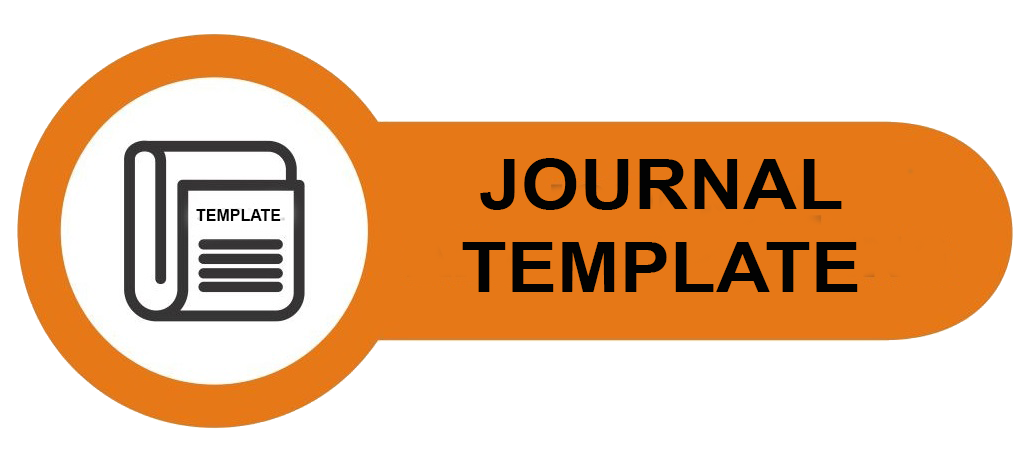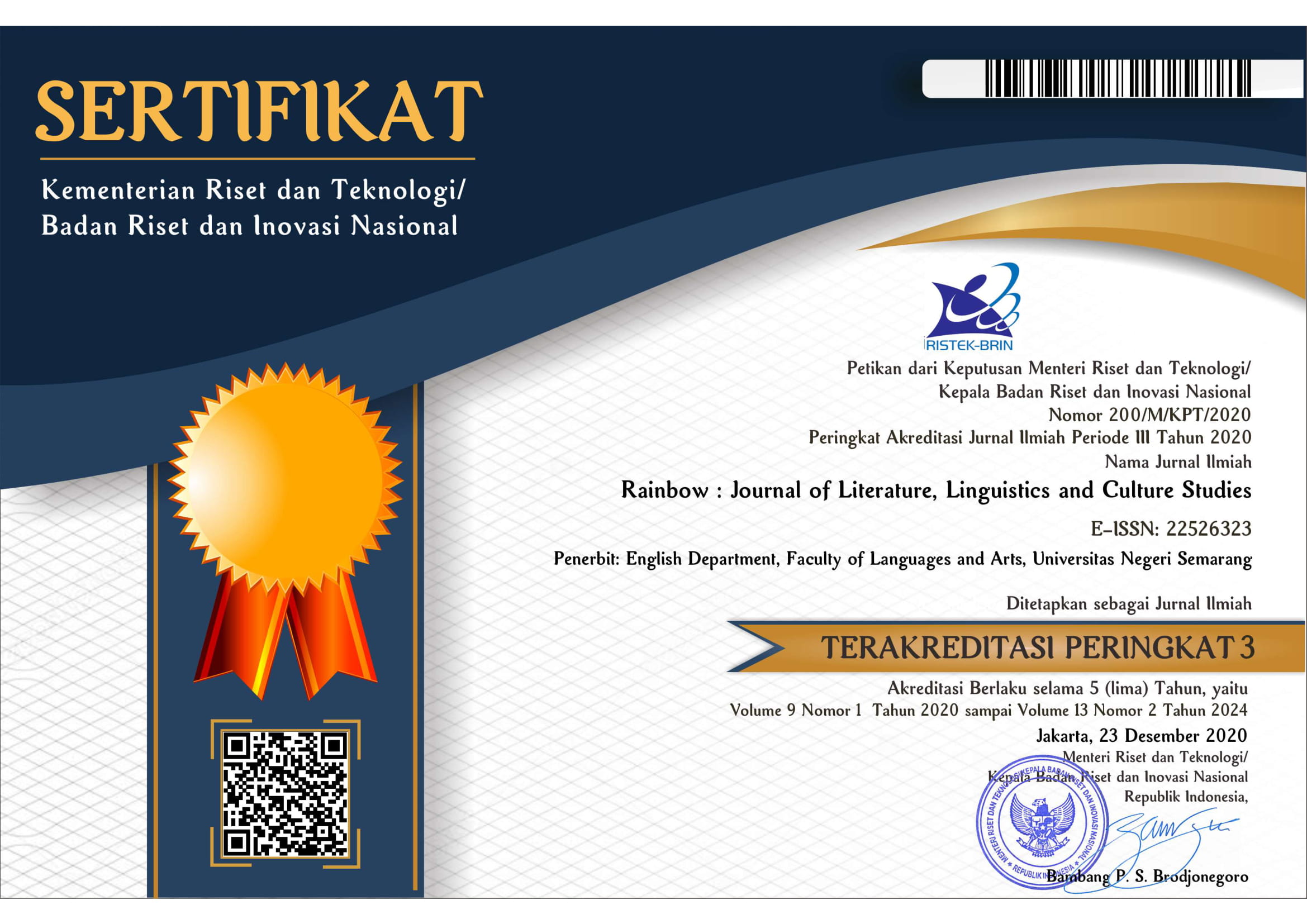SELF DEFENSE MECHANISMS IN OBESITY AS REFLECTED IN MEG CABOT’ SIZE 12 IS NOT FAT (A PSYCHOLOGICAL ANALYSIS)
Abstract
This study is aimed at explaining the main character’s personality as reflected in the story, the obesity problem in terms of the main character's psychology and the process of self defense mechanim in the main character’s psychological problem as reflected in Meg Cabot’ Size 12 Is Not Fat.The writer employed Meg Cabot’s Size 12 Is Not Fat as the object of this study. This study is a descriptive qualitative study based on the theory of psychological analysis and new criticism theory as the approaches. It is a descriptive qualitative research since each data is in the form of words, phrases, sentences, narrations and dialogues. The data are collected by reading the novel and references dealing with the topic analysis. The data then written in descriptive and in order to answer the research questions. The investigation of this research resulted in several findings. From the analysis it may be concluded that first, dealing with the obesity problem, the main character’s personality is described as an irritable and rude person. Second, obesity as the main character’s problem has affected her psychological conditions. On the one hand the main character tried to be confident with her new body size, but on the other hand, she felt desperate with her body. Third, the writer found that the self defense mechanism worked in the main character’s psychological problem.
Â
References
Barnet, Tara. 2013. What Is Displaced Anger.
http://www.wisegeek.com/what-is-displaced-anger.htm
[accessed 24/10/2013]
Bressler, C, E. 1994. Literary Criticism. New Jersey: Practice Hall. Inc.
Boulton, Marjorie. 1975. The Anatomy of the Novel. London: Routledge & Kegan Paul Ltd.
Cabot, Meg. 2010. Ukuran 12 Tidak Gemuk. Jakarta: PT. Gramedia Pustaka.
Cabot, Meg. 2006. Size 12 Is Not Fat. New York: Harper Collins Publishers, Inc. http://www.processtext.com/abclit.html
[accessed 24/02/2013]
Forster, E. M. 1974. Aspects of the Novel. England. Penguin Books.
Gibbons, H. Gary. 2013. What Causes Overweight and Obesity.
http://www.nhlbi.nih.gov/health/health-topics/topics/obe/causes.html [accessed 24/02/2013]
Griffin, Alexandra W. 2007. Women and Weight-Based Employment Discrimination.
http://www.cardozolawandgender.com/uploads/2/7/7/6/.../13-3_griffin.pdf
[accessed 08/07/2013]
Hardjana, Andre. 1994. Kritik Sastra: Sebuah Pengantar. Jakarta: PT Gramedia Pustaka Utama.
Harmon, William. 2003. A Handbook to Literature. Upper Saddle River, New Jersey: Pearson Education, Inc.
Harper, Robert Allan. 1974. Psychoanalysis and Psychotheraphy. United States of America: Prentice-Hall, Inc.
Huberman, Michael and Miles, Matthew B. 1994. Qualitative Data Analysis. California: Sage Publications
Martini, Fransisca T. 2010. Children‟s Defense Mechanism in Brother Grimms Tale Hansel and Gretel. A Final Project. English Department, Faculty of Languages and Arts, Semarang State University.
Martino, Sara. 2008. The Rise of Obesity in Young Women: Does the Media Have An Impact?
http://www.scientificjournals.org/journals2008/articles/1403.pdf‎
[accessed 06/02/2013]
Moghaddam, Fathali M. 2004. From Psychology in Literature to Psychology is Literature: An Exploration of Boundaries and Relationships http://tap.sagepub.com [accessed 22/03/2013]
Nurgiyantoro, Burhan. 1995. Teori Pengakajian Fiksi. Yogyakarta: UGM Press
Odgen, Jane and Cecelia Clementi. 2010. The Experience of Being Obese and the Many Consequences of Stigma.
http://www.hindawi.com/journals/jobe/2010/429098/[accessed22/03/2013]
Owen, P.R. and Laurel Seller. 2000. Weight and Shape Ideals: Thin Is Dangerously In. [https://www.stmarytx.edu/academics/humanities/undergraduate/psychology/psychology-faculty/patricia-r-owen-ph-d/ [accessed 20/03/2013]
Pritchard, Mary. 2013. Emotional Eating as a Coping Mechanism.
http://www.huffingtonpost.com/mary-pritchard/emotional-eating_b_2892147.html [accessed 06/10/2013]
Puhl, Rebecca and Kelly D. Brownell. 2003. Ways of coping with obesity stigma: Review and conceptual analysis.
http://www.yaleruddcenter.org/resources/upload/docs/what/.../ways-of-coping.pdf‎ [accessed 06/05/2013]
Rees, R. J., 1973. English Literature: An Introduction for Foreign Readers. London: Peninsula Press. Ltd
Roberts, Edgar V. 2003. Writing about Literature (Xth edition). Upper Saddle, New Jersey: Pearson Education, Inc.River, New Jersey: Pearson Education, Inc.
Ryan, Michael. 2012. An Introduction to Criticism Literature/Film/Culture. Singapore: Ho Printing Singapore Pte Ltd.
Roberts, Edgar V. and Henry Jacobs E. 1987. Fiction: An Introduction to Reading and Writing. New Jersey. Prentice-Hall, Inc.
Roehling, Mark V. 2007. The Relationship between Body Weight and Perceived Weight-related Employment Discrimination: The role of sex and race. Journal of Vocational Behavior. 71: 300-318.
http://web.mit.edu/CME/Public/tmp.pdf [accessed 14/05/2013]
Smith, Melinda and Juelline Juffe. 2013. Depression in Women : Causes, Symptoms, and Treatment.
http://www.helpguide.org/mental/depression_women.htm
[accessed 14/10/2013]
Stice E, Shaw H. 1994. Adverse Effects of The Media Portrayed Thin-Ideal on Women and Linkages to Bulimic Symptomatology. Journal of Social and Clinical Psychology. 1994;13(3):288–308.
http://www.cronus.uwindsor.ca/users/j/jarry/.../0/.../Stice%20et%20al%20(1994).pdf [accessed 18/05/2013]
Waumsley, Julie. 2011. Obesity in the UK: A psychological perspective. http://www.bps.org.uk/sites/default/files/images/pat_rep95_obesity_web.pdf . [accessed 14/05/2013]
Wilkinson, Michelle. 2010. Why Women tend to be Sensitive About Their Weight.
http://www.livinghealthy360.com/index.php/why-women-tend-to-be-sensitive-about-their-weight-2-20417/ [accessed 14/10/2013]
Wellek, Rene and Austin Warren. 1973. Theory of Literature. New York: Harcourt, Grave Jouvan Inc.







